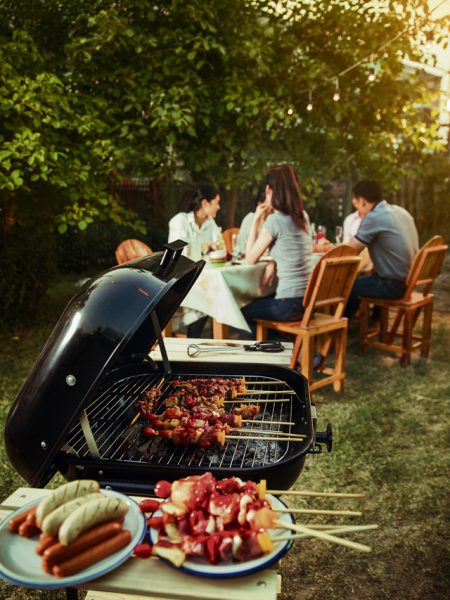
Food safety is easy to overlook at summer picnics. These easy tips from the Food and Drug Administration ensure a deliciously healthy BBQ:
General food safety tips
Food handling:
- Keep cold food cold with ice or frozen gel packs.
- Cold food should be stored at 40°F or below.
- Keep coolers closed. This keeps the contents cold longer.
- Do not cross-contaminate. Keep raw meat/poultry/seafood wrapped to avoid contaminating other picnic foods.
Clean your produce. Rinse fresh fruits and vegetables before packing.
For more summertime food safety tips, visit: https://www.fda.gov/food/buy-store-serve-safe-food/handling-food-safely-while-eating-outdoors
- Remember to thaw meat and poultry slowly in the refrigerator or under cold running water before cooking. Microwave defrosting is acceptable if the meat will be cooked immediately afterwards.
- Harmful bacteria usually grow in the “danger zone” between 40° and 140° F, so keep meat and poultry in the refrigerator until you are ready to throw it on the grill. Marinate it in the refrigerator too. If you want to use additional marinade as a sauce, be sure to boil it first to kill the bacteria or set a portion of it aside so it is not contaminated by raw meat.
- Precooking in the oven or microwave can reduce time at the grill but only precook immediately before finishing on the grill. Never partially grill meat or poultry and finish cooking later.
- When transporting food to another location, use a cooler with ice to keep it at 40°F or below. Everything should stay chilled until immediately before it will be cooked or consumed. Keep the cooler out of the direct sun and avoid opening the lid too often. It helps to keep beverages in a separate cooler.
- As always, cleanliness is essential to prevent food-borne illness. Wash hands, surfaces and utensils frequently with soap and water or antiseptic wipes.
- Never use the same plate, cutting board, or utensils for cooked food that you used for raw meats and poultry. Bacteria in the juices of raw meat and poultry can contaminate safely cooked food.
- Meat and poultry cooked on a grill browns very quickly but may not be cooked inside. Always use a food thermometer to be sure the food has reached a safe internal temperature. In the case of whole poultry this should be 180°F in the middle. Hamburgers and pork chops should reach 160°F throughout. Beef, veal, and lamb chops can be cooked to 145°F.
- After cooking, keep meat and poultry at 140°F or warmer until eaten. If fully cooked meats like hot dogs need to be reheated, grill them to 165°F.
- Refrigerate any hot or cold leftovers promptly in shallow containers. Discard any food that is left out for more than two hours after cooking, or one hour if temperature is above 90°F.
Grilling:
Firing up the grill may be the largest safety hazard of the summer season. Use caution when grilling with open flame and careful when using charcoal lighter fluid. Nearly 5,000 people are injured annually while grilling. Outdoor barbecuing is a summer tradition and a national pastime. But it also presents two significant dangers — fires and food poisoning. warm weather causes food to spoil more quickly.
Before using a Grill:
- Check the connection between the propane tank and the fuel line.
- Make sure the venturi tubes — where the air and gas mix — are not blocked.
- Do not overfill the propane tank.
- Do not wear loose clothing while cooking at a barbecue.
- Be careful when using lighter fluid. NEVER use gasoline to light the grill.
- Do not add fluid to an already lit fire because the flame can flashback up into the container and explode.
- Keep all matches and lighters away from children.
- Teach your children to report any loose matches or lighters to an adult immediately. Supervise children around outdoor grills.
- Dispose of hot coals properly — douse them with plenty of water and stir them to ensure that the fire is out. Never place them in plastic, paper or wooden containers.
- Never grill/barbecue in enclosed areas — carbon monoxide could be produced.
- Make sure everyone knows to Stop, Drop Roll in case a piece of clothing does catch fire.
- Call 911 or your local emergency number if a burn warrants serious medical attention.


